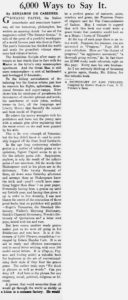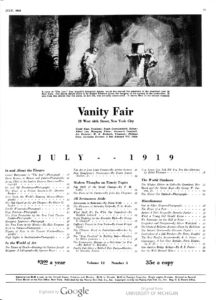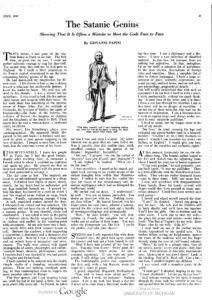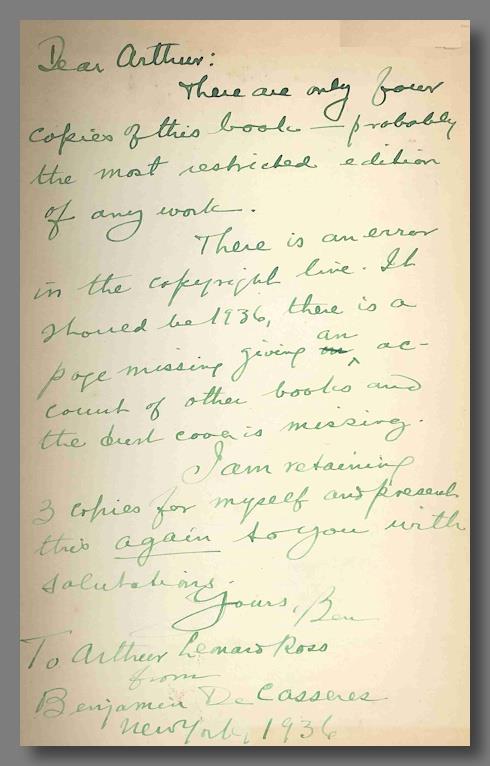The following article on a young stage actress named Mary Nash (August 15, 1884 – December 3, 1976) was published in Shadowland magazine in April 1922. Wikipedia notes that “she started her Hollywood career in 1936, appearing in 18 films.”
“Mary Nash: Versatile Actress”
by Benjamin DeCasseres
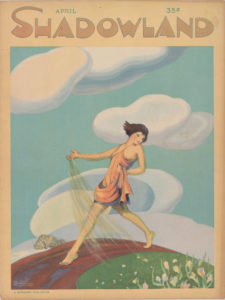 If you’ve seen Mary Nash as Anna Valeska in “Captain Applejack”– that rip-roaring “kidded melodrama” which is partly “Peter Pan,” partly “Seven Keys to Baldpate,” and partly just itself– you have seen a quivering, vital personality, totally unlike the blonde, pretty-face heroine of the average Broadway play.
If you’ve seen Mary Nash as Anna Valeska in “Captain Applejack”– that rip-roaring “kidded melodrama” which is partly “Peter Pan,” partly “Seven Keys to Baldpate,” and partly just itself– you have seen a quivering, vital personality, totally unlike the blonde, pretty-face heroine of the average Broadway play.
To follow her saps your strength. Her methods are more Continental than American or English. Her whole body acts– not merely her lips, her eyes and her gowns. She fires her role at you. It goes over with a rush and a roar.
When I went ino her dressing-room to interview her after the fall of teh final curtain of a certain Wednesday matinee, she was still Anna Valeska. She was still vibrating with the part, still pulsing tot he music of a fictional dream.
She is the dark, Spanish type of beauty– and every feature is fired by a cracking earnesness when she talks to you.No one is more perfectly natural and less stagy off-stage. One can see she enters con amore into her parts– she loves her art.
Humor threads all she says. Her eyes dance with laughter and over her face emotion after emotion– often contradictory– chase each other like thunderclouds mixed with golden sunshine.
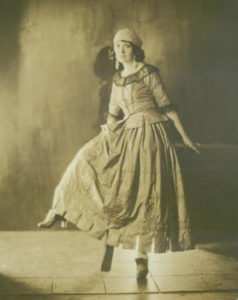
When only seventeen years of age, Miss Nash was cast to play a child of fourteen by Clyde Fitch himself in “The City”– that astoundingly bold drama– for that time– which was produced after Fitch’s death. That was really her first part.
“I never had a bit of stage fright,” she said. “I took to acting naturally from the first time I faced an audience. From childhood I had been a play ‘fan,’ and while sitting on my seat I always conceived myself on the other side of the footlights doing the things that those actresses did which I admired. I could always project myself mentally into the parts I loved and, when my great moment came in ‘The City,’ I merely felt as tho I was taking posession of something that belonged to me– from before birth probably.
“Some actresses are born, some made, and others have their parts thrust upon them by producers. I was a born actress. Voila!”
Miss Nash has appeared with Ethel Barrymore and Grace George. She has appeared in plays by William de Mille and David Belasco.
“I have never played two parts alike in my life. I have never been and never want to be —- identified with any special role or any special school of acting. There is not only fun but health in versatility. I am avid. I am hungry, for all kinds of roles, serious -— comic, melodramatic, vamp and ingenue. No producer can say ‘That is a Mary Nash part.’ It doesn’t exist. But I always like them to say when they are stuck, “Let’s get Mary Nash– she can handle anything.”
I congratulated her on a healthy sense of self-appreciation, but she waved me off with a n’importe!
“What we need in this country badly,” she said with a quick pirouete of thought, “is soemthing like the Conservatiore in Paris. We need a national school of acting that will at least standardize our language. The stage here suffers from too many kinds of American brogue. We ave new England schools of acting, Southern schools, Western schools, New York schoos– all handling the same words with different prnunciations and enunciations. The American stage lacks an American tongue common to all.
“Then again technical training for the stage– in the sense that it exists in Europe– is almost unknown here. A born actress, of course, does not require much technical training. Acting is an art. It is not taken seriously enough here. Doing tricks of illusion on the stage is not acting. Before I learn my part, for instance, I know everbody elses part in the play. I play into the spirit of the drama or comedy in which I am cast. During the first week of a new play when I’m off stage, I watch the parts I’m not in from the wings, and make mental notes on where I can improve my own work. I want to fit perfectly into the spirit of the whole action– not merely ‘do a part.’ The latter is a fault of many of our actors and actresses, and savors too much of the movies—-”
“My cue!–the movies. (It’s always a cue in every conversation.)
“Yes—I love the movies—real movies. I do not go to the movies merely to see them—there is so much trash. I select—as I do plays and books and gowns.
“I was in one picture—a George Fitzmaurice picture ; but found that I could not act on the speaking stage and keep up my work in the pictures without doing myself and my employers an injustice. After one has spent the morning and afternoon in the studio doing pictures, one is totally—at least I was—unfit for work at night. I attribute a great deal of the inferior work of many of our actors and actresses on the speaking stage to the fact that they are played out by the picture work they are doing on the side.
“The pictures themselves I consider the most tremendous innovator and social influence of modern times. In the small towns thruout the country, for instance, they have become the glass of fashion for the young women. The pictures have taught them how to dress. They have brought to them new ideals of feminine charm and beauty. They all want to dress and smile like Norma Talmadge. The movies have revolutionized the wardrobes of the middle-class young woman.
“They are doing the same for furniture and interior decoration. I noticed in many Middle Western and Southern homes that rooms were furnished like movie sets. Imitative maybe—but it has raised the level.”
At the mention of “foreign pictures,” Miss Nash was all excitement again.
“Pola Negri !—she is an event. At her best she is one of the greatest actresses on or off the screen. She is a born actress. One does not believe she is acting to the directions of a megaphone or that she is conscious of the camera. She seems to be living her part, ejecting it from her very self, not from a scenario. Her vitality, her facial and bodily emotions swim right out of the screen. She does in the dumb world of the film what very few actresses have even been able to get over on the speaking stage. She conveys, in her parts, every nuance of the feminine soul. There is something great in that woman that I cannot describe. I only know it ‘gets you.’ It is genius.
“How different from the insipid, vapid, doll-baby stuff of most of our American screen actresses ! Pola Negri puts vital womanhood on the screen—not a director’s trick-bear.
“Personal habits—likes and dislikes ? I haven’t any outside of those I told you. I am not athletic or outdoors. In books I am hopelessly Mid-Victorian. I love my home. I love to embroider—and I love the play from an orchestra seat. I am at every odd matinee around town.
“I have embroidered whole luncheon sets on the stage in parts where I have used the basket and the knitting-needle. I believe I am the only actress who does this. And I never missed a cue. I cant embroider in my present part-but I hope my next part will enable me”I have embroidered whole luncheon sets on the stage in parts where I have used the basket and the knitting-needle. I believe I am the only actress who does this. And I never missed a cue. I cant embroider in my present part-but I hope my next part will enable me to complete on the stage ”
“Those two silk ties you promised me.” broke in Miss Nash’s husband, who had come in just in time to hear her last sentence.
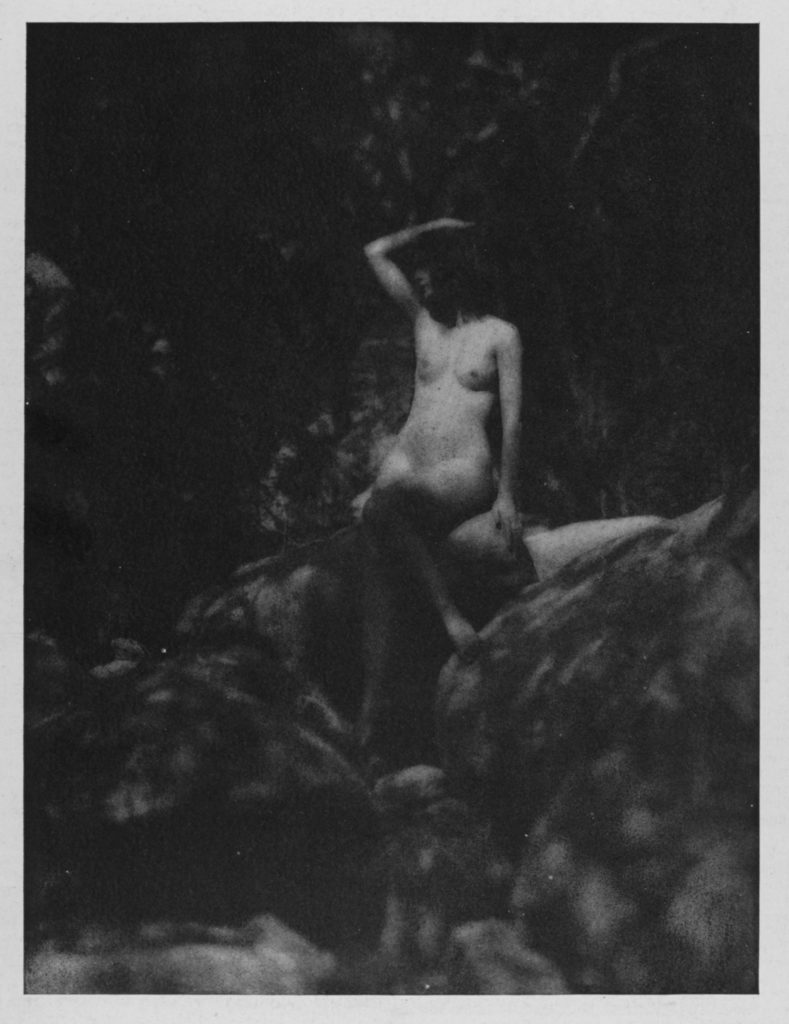













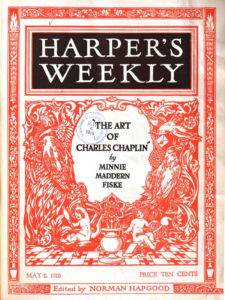 THE UNCONQUERABLE JEW
THE UNCONQUERABLE JEW